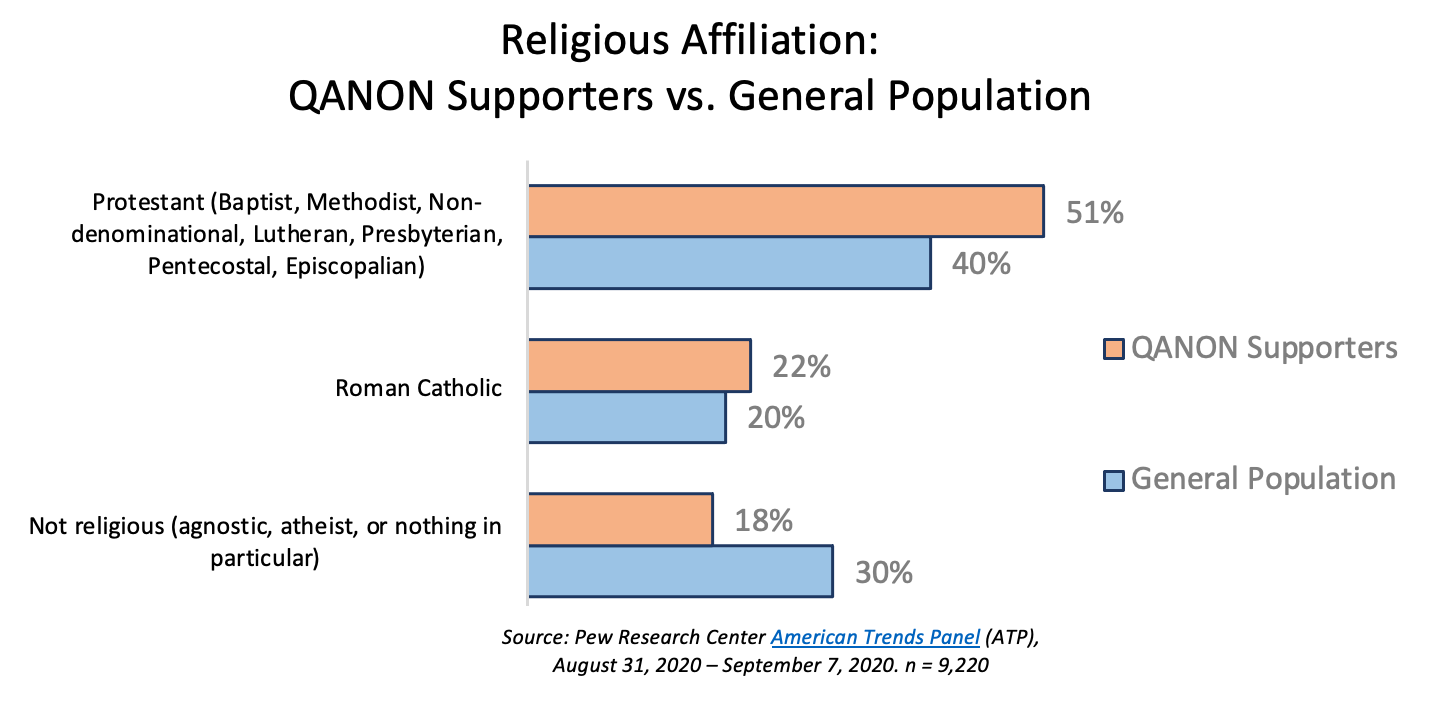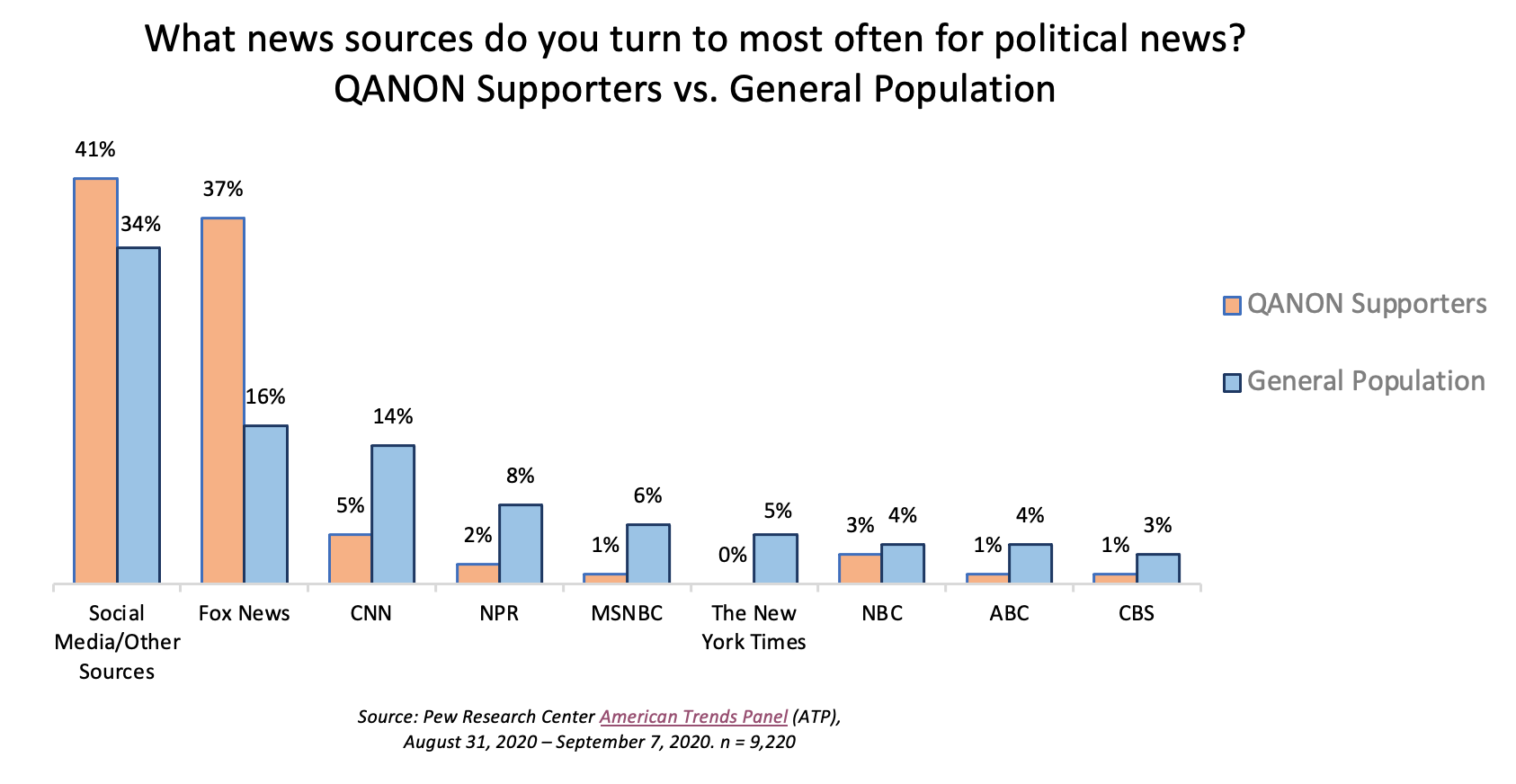Who are QAnon Supporters? 5 Revealing Findings from Survey Data
By: Zachey Kliger
In November 2017, two moderators of the website “4chan” began posting cryptic messages about “state secrets” using the name “Q”. The authors, claiming to be high-ranking military officers, suggested that Donald Trump was waging a top-secret war against a cabal of satanic criminals, including Hillary Clinton and Hollywood elites, who were running an international sex-trafficking ring.
By the end of 2018, QAnon, a loosely organized network and community of people who believe in a range of conspiracy theories, had spread into the mainstream: Michael Flynn, President Trump’s National Security Advisor, publicly embraced it. QAnon paraphernalia had become a staple at President Trump’s rallies. And national media outlets were increasingly covering the movement’s rise.
The harmful impact of QAnon cannot be overstated: QAnon conspiracy theories have popularized distrust in our institutions, and contributed to acts of domestic extremism and violence, including the events that took place at the Capitol on January 6.
To assess the scope of QAnon’s support, and to identify common demographic and psychographic characteristics of QAnon supporters, I analyzed survey data collected by the Pew Research Center between August 31, 2020 – September 7, 2020.
I highlight five takeaways from my analysis here, and provide recommendations for regulatory reform to combat QAnon and similar movements that may emerge in the future.
Key Findings
Takeaway #1: At its peak, close to 30 Million Americans may have supported QAnon.
Estimates of the scope of QAnon’s support have varied widely. Some news outlets, observing the size of QAnon-inspired Facebook groups, have speculated that about three million Americans believe in the conspiracy.
Of the 9,220 respondents surveyed by Pew in September, 8% self-identified as supporters of QAnon. Extrapolating to the general population, there were roughly 26 million QAnon supporters at that time. That number is likely to only have grown in recent months, amidst a polarizing Presidential election and ongoing COVID lockdowns.
Takeaway #2: QAnon supporters are not exclusively Republican.
A slim majority of QAnon supporters do self-identify as “Conservative”. However, nearly half don’t. 28% of QAnon supporters surveyed identify as “Independent”, 9% identify as “Democrat”, and 9% identify as “something else”.
The Republican party certainly bears responsibility for the movement’s rise: Its leaders as a whole have not ostracized or spoken out against QAnon, and a handful of House members, including Freshman congresswoman Marjorie Taylor Greene, are supporters themselves. But it is worth noting that many of QAnon’s supporters don’t identify as Republican, and don’t vote for Republican candidates. As resentment for America’s two-party system continues to build, more movements that defy traditional ideological lines are likely to emerge.
Takeaway #3: QAnon supporters are disproportionately religious.
The parallels between cults, conspiracies and religion are well-documented. And according to the Pew survey data, supporters of the QAnon movement are disproportionately religious. 51% of QAnon supporters who were surveyed identified as Protestant, and 22% identified as Roman Catholic. Only 18% said they were not religious at all. Conversely, 40% of the general population surveyed identified as Protestant, and 30% identified as not religious.
Furthermore, QAnon supporters, on average, attend religious services more frequently than the general population. 35% of QAnon supporters surveyed said they attend religious services at least once a week, and 62% have attended a religious service at least once in the last year. Meanwhile, 51% of the general population surveyed said they seldom attend religious services.
Takeaway #4: Relative to the General Population, QAnon supporters are financially secure and well-educated.
Income: It is often suggested that people who subscribe to conspiracy theories tend to be financially vulnerable, or poorly educated. Contrary to such perceptions, the household income of QAnon supporters is comparable to that of the general population. Compared to the general population, a slightly higher share of QAnon supporters have a household income above $75,000/year, and a slightly lower proportion of QAnon supporters have a household income below $30,000/year.
Education: QAnon supporters are also well-educated relative to the general U.S. population: 28% of QAnon supporters have a college degree, compared with 30% of the general population. There are, however, some interesting differences in levels of educational attainment between QAnon supporters and the general population. Compared to the general population, a much lower share of QAnon supporters have a postgraduate degree (21% to 29%), and a slightly higher share have an Associate’s degree (13% to 9%).
Takeaway #5: QAnon supporters trust their social media feeds more than any other news source.
Contemporary social media has enabled disinformation to spread more effectively, and has abetted extremist movements. Nevertheless, it is interesting to see how much QAnon supporters are reliant on social media for their news to the exclusion of all other mainstream sources (other than Fox News). Furthermore, the extent to which QAnon supporters harbor a deep mistrust of journalists is startling: 65% of QAnon supporters think most of the information journalists disseminate is made up.
Policy Implications
QAnon in its current form may be on the decline. According to reports, Trump’s defeat and Biden’s inauguration have forced many QAnon supporters to begin contemplating a future without QAnon. But it’s important to absorb the lessons learned from QAnon’s rapid ascent, and take measures to prevent the next QAnon. The Department of Homeland Security, the agency primarily responsible for ensuring the homeland is safe, secure and resilient against terrorism and other potential threats, should play an integral role in this effort.
Two of the primary methods by which the DHS executes its mission is through the promulgation of regulatory actions, and Presidential Directives.
It’s clear that federal regulation is necessary in order to compel the largest technology companies to limit hate speech and misinformation on their platforms. This could take multiple forms, and the DHS should play an active role in shaping the regulatory framework. For example, the Cybersecurity and Infrastructure Security Agency (CISA), a division of the DHS, could work with big tech lobbyists and other stakeholders to expand content moderation efforts, including fact checking and labeling. DHS could also lend support to the passage of “Protecting Americans from Dangerous Algorithms Act” (PADAA), a bill introduced by two House Democrats last year which imposes liability on social media firms for algorithmically curated speech or social connections later implicated in extremist violence.
Additionally, movements like QAnon have emerged in part because social media and hyper partisan “watchdog” sites have filled the void left by the local news industry, which has been decimated over the past two decades. Expanding media literacy training in schools, and increasing direct government support for local news organizations, would help to combat these news deserts and rebuild trust in news. The DHS could issue a Presidential Directive, and work with allies in Congress, to advocate for greater investment in these areas.
Finally, faith-based organizations should be an ally in the fight against QAnon and other conspiracies that have the potential to cause harm. The DHS Center for Faith-Based and Neighborhood Partnerships could prove to be a useful infrastructure for coordinating with faith leaders, houses of worship and community organizations to monitor, flag and deter harmful conspiracies.
By using its intelligence-gathering capabilities to better understand the actors involved in spreading QAnon, partnering with faith-based organizations and other community stakeholders to discourage support for harmful conspiracies as they emerge, and leveraging its rulemaking capabilities to advance more stringent regulations of social media, the DHS can prevent future conspiracy movements from achieving violent ends.
Zachey Kliger (MPA ‘22) is the Editor-in-Chief of The Morningside Post. He is studying Social Policy with a specialization in Technology, Media, and Communications.







